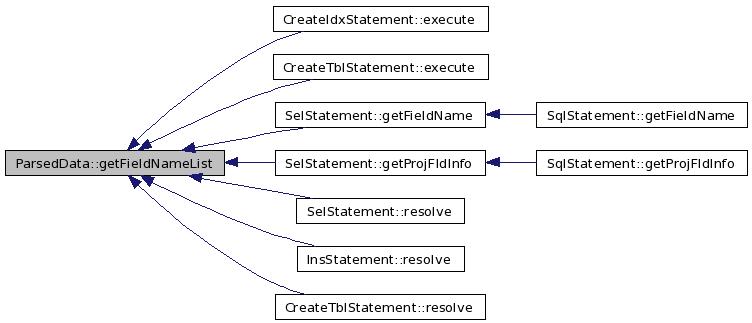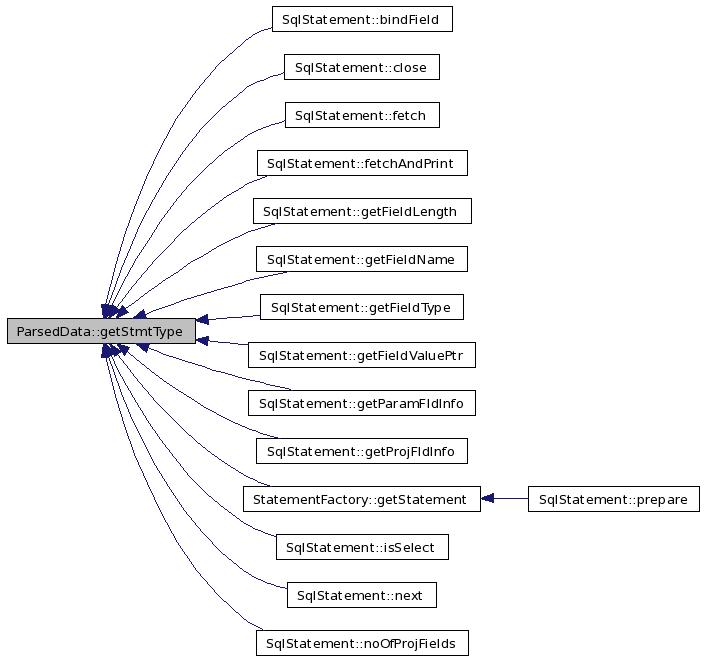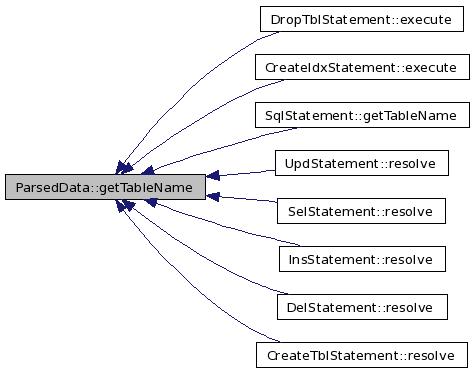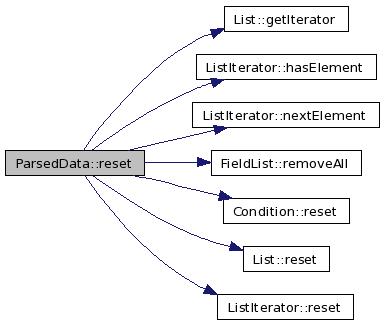
#include <Parser.h>
Collaboration diagram for ParsedData:

Definition at line 74 of file Parser.h.
| ParsedData::ParsedData | ( | ) | [inline] |
Definition at line 121 of file Parser.h.
References hashIndex, and UnknownStatement.
00121 { paramCounter = 0; stmtType = UnknownStatement; 00122 isUnique = false; isPrimary = false; indexType = hashIndex;}
| ParsedData::ParsedData | ( | ) | [inline] |
Definition at line 121 of file Parser.h.
References hashIndex, and UnknownStatement.
00121 { paramCounter = 0; stmtType = UnknownStatement; 00122 isUnique = false; isPrimary = false; indexType = hashIndex;}
| void ParsedData::clearFieldNameList | ( | ) |
| void ParsedData::clearFieldNameList | ( | ) |
Definition at line 153 of file ParsedData.cxx.
References List::reset().
00154 { 00155 fieldNameList.reset(); 00156 }
Here is the call graph for this function:

| Condition* ParsedData::getCondition | ( | ) | [inline] |
| Condition* ParsedData::getCondition | ( | ) | [inline] |
Definition at line 148 of file Parser.h.
Referenced by UpdStatement::resolve(), SelStatement::resolve(), and DelStatement::resolve().
Here is the caller graph for this function:

| List ParsedData::getConditionValueList | ( | ) | [inline] |
| List ParsedData::getConditionValueList | ( | ) | [inline] |
Definition at line 153 of file Parser.h.
Referenced by UpdStatement::resolveForAssignment(), and DelStatement::resolveForCondition().
Here is the caller graph for this function:

| FieldList ParsedData::getCreFldList | ( | ) | [inline] |
| FieldList ParsedData::getCreFldList | ( | ) | [inline] |
Definition at line 174 of file Parser.h.
Referenced by CreateTblStatement::resolve().
Here is the caller graph for this function:

| List ParsedData::getFieldNameList | ( | ) | [inline] |
| List ParsedData::getFieldNameList | ( | ) | [inline] |
Definition at line 152 of file Parser.h.
Referenced by CreateIdxStatement::execute(), CreateTblStatement::execute(), SelStatement::getFieldName(), SelStatement::getProjFldInfo(), SelStatement::resolve(), InsStatement::resolve(), and CreateTblStatement::resolve().
Here is the caller graph for this function:

| List ParsedData::getFieldValueList | ( | ) | [inline] |
| List ParsedData::getFieldValueList | ( | ) | [inline] |
Definition at line 154 of file Parser.h.
Referenced by InsStatement::resolve().
Here is the caller graph for this function:

| char* ParsedData::getIndexName | ( | ) | [inline] |
| char* ParsedData::getIndexName | ( | ) | [inline] |
Definition at line 128 of file Parser.h.
Referenced by DropIdxStatement::execute(), and CreateIdxStatement::execute().
Here is the caller graph for this function:

| IndexType ParsedData::getIndexType | ( | ) | [inline] |
| IndexType ParsedData::getIndexType | ( | ) | [inline] |
Definition at line 168 of file Parser.h.
Referenced by CreateIdxStatement::execute().
Here is the caller graph for this function:

| List ParsedData::getInValueList | ( | ) | [inline] |
| List ParsedData::getInValueList | ( | ) | [inline] |
| bool ParsedData::getPrimary | ( | ) | [inline] |
| bool ParsedData::getPrimary | ( | ) | [inline] |
Definition at line 170 of file Parser.h.
Referenced by CreateIdxStatement::execute().
Here is the caller graph for this function:

| StatementType ParsedData::getStmtType | ( | ) | [inline] |
| StatementType ParsedData::getStmtType | ( | ) | [inline] |
Definition at line 176 of file Parser.h.
Referenced by SqlStatement::bindField(), SqlStatement::close(), SqlStatement::fetch(), SqlStatement::fetchAndPrint(), SqlStatement::getFieldLength(), SqlStatement::getFieldName(), SqlStatement::getFieldType(), SqlStatement::getFieldValuePtr(), SqlStatement::getParamFldInfo(), SqlStatement::getProjFldInfo(), StatementFactory::getStatement(), SqlStatement::isSelect(), SqlStatement::next(), and SqlStatement::noOfProjFields().
00176 { return stmtType; }
Here is the caller graph for this function:

| char* ParsedData::getTableName | ( | ) | [inline] |
| char* ParsedData::getTableName | ( | ) | [inline] |
Definition at line 127 of file Parser.h.
Referenced by DropTblStatement::execute(), CreateIdxStatement::execute(), SqlStatement::getTableName(), UpdStatement::resolve(), SelStatement::resolve(), InsStatement::resolve(), DelStatement::resolve(), and CreateTblStatement::resolve().
Here is the caller graph for this function:

| bool ParsedData::getUnique | ( | ) | [inline] |
| bool ParsedData::getUnique | ( | ) | [inline] |
Definition at line 169 of file Parser.h.
Referenced by CreateIdxStatement::execute().
Here is the caller graph for this function:

| List ParsedData::getUpdateFieldValueList | ( | ) | [inline] |
| List ParsedData::getUpdateFieldValueList | ( | ) | [inline] |
Definition at line 156 of file Parser.h.
Referenced by UpdStatement::resolveForAssignment().
Here is the caller graph for this function:

| void** ParsedData::insertCondValueAndGetPtr | ( | char * | fName, | |
| char * | value | |||
| ) |
| void ** ParsedData::insertCondValueAndGetPtr | ( | char * | fName, | |
| char * | value | |||
| ) |
Definition at line 49 of file ParsedData.cxx.
References List::append(), ConditionValue::fName, ConditionValue::length, ConditionValue::paramNo, ConditionValue::parsedString, ConditionValue::type, typeUnknown, and ConditionValue::value.
Referenced by yyparse().
00050 { 00051 ConditionValue *newVal = new ConditionValue(); 00052 if (val == NULL) 00053 newVal->parsedString = NULL; 00054 else 00055 newVal->parsedString = strdup(val); 00056 newVal->value = NULL; 00057 newVal->paramNo = 0; 00058 newVal->type = typeUnknown; 00059 newVal->length = 0; 00060 strcpy(newVal->fName, fldName); 00061 conditionValueList.append(newVal); 00062 return &(newVal->value); 00063 00064 }
Here is the call graph for this function:

Here is the caller graph for this function:

| void ParsedData::insertField | ( | char * | fName | ) |
| void ParsedData::insertField | ( | char * | fName | ) |
Definition at line 66 of file ParsedData.cxx.
References List::append(), and FieldName::fldName.
Referenced by yyparse().
00067 { 00068 FieldName *newVal = new FieldName(); 00069 strcpy(newVal->fldName , fName); 00070 fieldNameList.append(newVal); 00071 }
Here is the call graph for this function:

Here is the caller graph for this function:

| void ParsedData::insertFieldValue | ( | FieldValue * | newVal | ) | [inline] |
Definition at line 150 of file Parser.h.
References List::append().
00150 { fieldValueList.append(newVal); }
Here is the call graph for this function:

| void ParsedData::insertFieldValue | ( | FieldValue * | newVal | ) | [inline] |
Definition at line 150 of file Parser.h.
References List::append().
Referenced by SelStatement::resolve().
00150 { fieldValueList.append(newVal); }
Here is the call graph for this function:

Here is the caller graph for this function:

| void ParsedData::insertFldDef | ( | ) |
| void ParsedData::insertFldDef | ( | ) |
Definition at line 191 of file ParsedData.cxx.
References FieldList::append(), and FieldDef::init().
Referenced by yyparse().
Here is the call graph for this function:

Here is the caller graph for this function:

| void ParsedData::insertInValue | ( | char * | value | ) |
| void ParsedData::insertInValue | ( | char * | value | ) |
Definition at line 35 of file ParsedData.cxx.
References List::append(), FieldValue::length, FieldValue::paramNo, FieldValue::parsedString, FieldValue::type, typeUnknown, and FieldValue::value.
Referenced by yyparse().
00036 { 00037 FieldValue *newVal = new FieldValue(); 00038 if (val == NULL) 00039 newVal->parsedString = NULL; 00040 else 00041 newVal->parsedString = strdup(val); 00042 newVal->value = NULL; 00043 newVal->paramNo = 0; 00044 newVal->type = typeUnknown; 00045 newVal->length = 0; 00046 inValueList.append(newVal); 00047 }
Here is the call graph for this function:

Here is the caller graph for this function:

| Predicate* ParsedData::insertPredicate | ( | char * | fldName, | |
| ComparisionOp | op, | |||
| char * | fldName | |||
| ) |
| Predicate* ParsedData::insertPredicate | ( | char * | fldName, | |
| ComparisionOp | op, | |||
| void ** | value | |||
| ) |
Definition at line 99 of file ParsedData.cxx.
References PredicateImpl::setTerm().
00100 { 00101 PredicateImpl *pImpl = new PredicateImpl(); 00102 pImpl->setTerm(p1, op, p2); 00103 return (Predicate*) pImpl; 00104 }
Here is the call graph for this function:

| Predicate * ParsedData::insertPredicate | ( | char * | fldName, | |
| ComparisionOp | op, | |||
| char * | fldName | |||
| ) |
Definition at line 92 of file ParsedData.cxx.
References PredicateImpl::setTerm().
00093 { 00094 PredicateImpl *pImpl = new PredicateImpl(); 00095 pImpl->setTerm(fName1, op, fName2); 00096 return (Predicate*) pImpl; 00097 }
Here is the call graph for this function:

| Predicate * ParsedData::insertPredicate | ( | char * | fldName, | |
| ComparisionOp | op, | |||
| void ** | value | |||
| ) |
Definition at line 86 of file ParsedData.cxx.
References PredicateImpl::setTerm().
Referenced by yyparse().
00087 { 00088 PredicateImpl *pImpl = new PredicateImpl(); 00089 pImpl->setTerm(fName, op, val); 00090 return (Predicate*) pImpl; 00091 }
Here is the call graph for this function:

Here is the caller graph for this function:

| void ParsedData::insertUpdateValue | ( | char * | fldName, | |
| char * | value | |||
| ) |
| void ParsedData::insertUpdateValue | ( | char * | fldName, | |
| char * | value | |||
| ) |
Definition at line 73 of file ParsedData.cxx.
References List::append(), UpdateFieldValue::fldName, UpdateFieldValue::paramNo, UpdateFieldValue::parsedString, and UpdateFieldValue::value.
Referenced by yyparse().
00074 { 00075 UpdateFieldValue *newVal = new UpdateFieldValue(); 00076 strcpy(newVal->fldName, fName); 00077 if (val == NULL) 00078 newVal->parsedString = NULL; 00079 else 00080 newVal->parsedString = strdup(val); 00081 newVal->value = NULL; 00082 newVal->paramNo = 0; 00083 updFldValList.append(newVal); 00084 }
Here is the call graph for this function:

Here is the caller graph for this function:

| void ParsedData::insertValue | ( | char * | value | ) |
| void ParsedData::insertValue | ( | char * | value | ) |
Definition at line 21 of file ParsedData.cxx.
References List::append(), FieldValue::length, FieldValue::paramNo, FieldValue::parsedString, FieldValue::type, typeUnknown, and FieldValue::value.
Referenced by yyparse().
00022 { 00023 FieldValue *newVal = new FieldValue(); 00024 if (val == NULL) 00025 newVal->parsedString = NULL; 00026 else 00027 newVal->parsedString = strdup(val); 00028 newVal->value = NULL; 00029 newVal->paramNo = 0; 00030 newVal->type = typeUnknown; 00031 newVal->length = 0; 00032 fieldValueList.append(newVal); 00033 }
Here is the call graph for this function:

Here is the caller graph for this function:

| void ParsedData::reset | ( | ) |
| void ParsedData::reset | ( | ) |
Definition at line 106 of file ParsedData.cxx.
References List::getIterator(), ListIterator::hasElement(), hashIndex, ListIterator::nextElement(), UpdateFieldValue::parsedString, ConditionValue::parsedString, FieldValue::parsedString, FieldList::removeAll(), Condition::reset(), List::reset(), ListIterator::reset(), UpdateFieldValue::value, ConditionValue::value, and FieldValue::value.
Referenced by SqlStatement::free().
00107 { 00108 ListIterator fNameIter = fieldNameList.getIterator(); 00109 fNameIter.reset(); 00110 while (fNameIter.hasElement()) 00111 delete (Identifier *) fNameIter.nextElement(); 00112 fieldNameList.reset(); 00113 ListIterator iter = fieldValueList.getIterator(); 00114 FieldValue *value; 00115 while (iter.hasElement()) 00116 { 00117 value = (FieldValue*)iter.nextElement(); 00118 free(value->parsedString); 00119 free(value->value); 00120 delete value; 00121 } 00122 fieldValueList.reset(); 00123 inValueList.reset(); 00124 predicate.reset(); 00125 00126 iter = conditionValueList.getIterator(); 00127 ConditionValue *condVal; 00128 while (iter.hasElement()) 00129 { 00130 condVal = (ConditionValue*)iter.nextElement(); 00131 free(condVal->parsedString); 00132 free(condVal->value); 00133 delete condVal; 00134 } 00135 conditionValueList.reset(); 00136 00137 iter = updFldValList.getIterator(); 00138 UpdateFieldValue *updFldVal; 00139 while (iter.hasElement()) 00140 { 00141 updFldVal = (UpdateFieldValue*)iter.nextElement(); 00142 free(updFldVal->parsedString); 00143 free(updFldVal->value); 00144 delete updFldVal; 00145 } 00146 updFldValList.reset(); 00147 00148 creFldList.removeAll(); 00149 isUnique = false; 00150 isPrimary = false; 00151 indexType = hashIndex; 00152 }
Here is the call graph for this function:

Here is the caller graph for this function:

| void ParsedData::setCondition | ( | Predicate * | pred | ) | [inline] |
Definition at line 142 of file Parser.h.
References Condition::setPredicate().
00143 { 00144 //No body is deleting memory allocated during condition::setTerm for PredicateImpl 00145 //have list in this pared data and delete it during reset 00146 predicate.setPredicate(pred); 00147 }
Here is the call graph for this function:

| void ParsedData::setCondition | ( | Predicate * | pred | ) | [inline] |
Definition at line 142 of file Parser.h.
References Condition::setPredicate().
Referenced by yyparse().
00143 { 00144 //No body is deleting memory allocated during condition::setTerm for PredicateImpl 00145 //have list in this pared data and delete it during reset 00146 predicate.setPredicate(pred); 00147 }
Here is the call graph for this function:

Here is the caller graph for this function:

| void ParsedData::setDefaultValue | ( | char * | value | ) |
| void ParsedData::setDefaultValue | ( | char * | value | ) |
Definition at line 178 of file ParsedData.cxx.
References DEFAULT_VALUE_BUF_LENGTH, FieldDef::defaultValueBuf_, and FieldDef::isDefault_.
Referenced by yyparse().
00179 { 00180 fldDef.isDefault_ = true; 00181 if (strlen(value) > DEFAULT_VALUE_BUF_LENGTH -1) 00182 { 00183 strncpy(fldDef.defaultValueBuf_, value, DEFAULT_VALUE_BUF_LENGTH -1); 00184 fldDef.defaultValueBuf_[DEFAULT_VALUE_BUF_LENGTH] ='\0'; 00185 } else 00186 strcpy(fldDef.defaultValueBuf_, value); 00187 return; 00188 }
Here is the caller graph for this function:

| void ParsedData::setFldLength | ( | size_t | length | ) |
| void ParsedData::setFldLength | ( | size_t | length | ) |
Definition at line 169 of file ParsedData.cxx.
References FieldDef::length_.
Referenced by yyparse().
00170 { 00171 fldDef.length_ = length; 00172 }
Here is the caller graph for this function:

| void ParsedData::setFldName | ( | char * | name | ) |
| void ParsedData::setFldName | ( | char * | name | ) |
Definition at line 158 of file ParsedData.cxx.
References FieldDef::fldName_, and IDENTIFIER_LENGTH.
Referenced by yyparse().
00159 { 00160 strcpy(fldDef.fldName_, name); 00161 fldDef.fldName_[IDENTIFIER_LENGTH] = '\0'; 00162 }
Here is the caller graph for this function:

| void ParsedData::setFldNotNull | ( | bool | notNull | ) |
| void ParsedData::setFldNotNull | ( | bool | notNull | ) |
Definition at line 174 of file ParsedData.cxx.
References FieldDef::isNull_.
Referenced by yyparse().
00175 { 00176 fldDef.isNull_ = notNull; 00177 }
Here is the caller graph for this function:

| void ParsedData::setFldType | ( | DataType | type | ) |
| void ParsedData::setFldType | ( | DataType | type | ) |
Definition at line 164 of file ParsedData.cxx.
References FieldDef::type_.
Referenced by yyparse().
00165 { 00166 fldDef.type_ = type; 00167 }
Here is the caller graph for this function:

| void ParsedData::setIndexName | ( | char * | name | ) | [inline] |
| void ParsedData::setIndexName | ( | char * | name | ) | [inline] |
| void ParsedData::setIndexType | ( | IndexType | type | ) | [inline] |
| void ParsedData::setIndexType | ( | IndexType | type | ) | [inline] |
| void ParsedData::setPrimary | ( | bool | primary | ) | [inline] |
| void ParsedData::setPrimary | ( | bool | primary | ) | [inline] |
| void ParsedData::setStmtType | ( | StatementType | type | ) | [inline] |
| void ParsedData::setStmtType | ( | StatementType | type | ) | [inline] |
| void ParsedData::setTableName | ( | char * | name | ) | [inline] |
| void ParsedData::setTableName | ( | char * | name | ) | [inline] |
| void ParsedData::setUnique | ( | bool | unique | ) | [inline] |
| void ParsedData::setUnique | ( | bool | unique | ) | [inline] |
 1.4.7
1.4.7